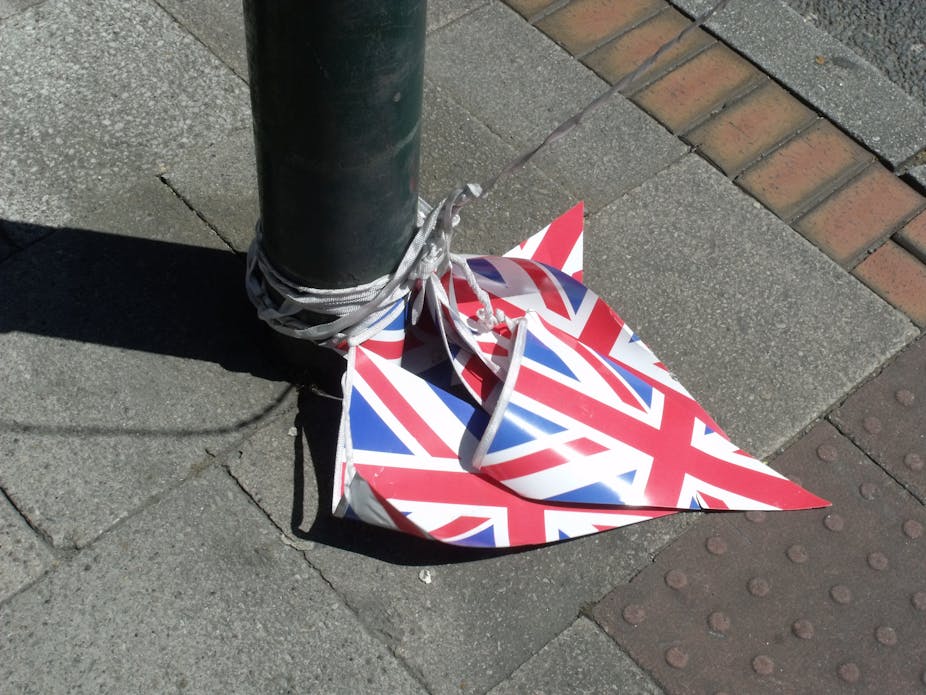David Cameron warned in a major foreign policy speech on May 9 that peace and stability cannot be assured in Europe if the UK leaves the European Union. The prime minister is right: the EU is a guarantee for peace in Europe.
But at least as importantly for the UK, the EU is also a guarantee for British political power in Europe – and for its international standing in the United States, the United Nations, China, the Middle East and Africa.
The UK began to lose its status in the world in the 1960s. The Commonwealth did not become an important economic trading zone, the UK was dependent on the United States and it was outside Europe. It finally entered the European Economic Community (EEC) in 1973, and just two years later, 67% of voters supported the campaign to stay in.
Today, from a realpolitik perspective, the EU is the UK’s main foreign policy instrument. By leaving, the UK would ruin its national interest.
Britain, together with France, is the most important foreign policy actor in the EU. It acts via a discreet informal body, the Quint, which decides on all highly sensitive aspects of European foreign policy. The Quint includes only five states: the UK, France, Germany and Italy and a notable outsider – the United States. The Quint is considered a directorate, in the sense that it takes initiatives, discusses EU foreign policy issues, and small EU countries have to accept its authority.

UK as agenda-setter
The UK often shapes EU foreign policy in its own terms. It has some of the best diplomats in the EU institutions. Since the end of the Cold War, the UK has set the agenda for EU trade policies, as British officials had key posts in EU institutions.
Leon Brittan, as commissioner for competition from 1989 to 1993 and trade commissioner from 1993 to 1999, contributed to establishing trade partnerships with states in the world. In 2004, Peter Mandelson ran the trade portfolio of the European Commission, and the Doha trade negotiations. He was followed by Catherine Ashton, who became High Representative of the EU, and who was critical in establishing long-term working relations with Iran and the African Union.

The UK has made it possible for the EU to act diplomatically, including imposing sanctions in the Balkans, Asia, and states in Africa such as Zimbabwe since the late 1990s.
It is a model for development aid and the first G8 state to meet the Millennium Development Goal for developed countries to spend 0.7% of their gross national income on overseas aid. It has also been adamant that the EU should impose conditions on aid to states which do not respect human rights.
The UK, France and Germany are the most important military forces in the EU. The UK has led military intervention to combat piracy in the Gulf of Aden since 2008. The UK helped contain conflict in the Democratic Republic of the Congo (DRC) by sending troops in 2003, and it authorised and supported EU operations in the DRC in 2006, in Chad in 2008 and 2009, and in the Central African Republic in 2014 and 2015.
It is also active in EU civilian operations and has provided heads of mission in Sudan from 2004 to 2005, Iraq from 2005 to 2009, and Palestine from 2006 to 2009. It provides the EU’s current civilian operations commander, Kenneth Deane.
Losing its international status
By relinquishing its monumental influence in the EU, the UK would lose its special relationship with the US. President Barack Obama made this clear on his recent visit to the UK. Five former NATO chiefs and 13 former US secretaries of state and defence have also cautioned against leaving the EU. Cutting the special indirect link to the EU for the US would be devastating for British diplomacy.
On the international stage, the UK would have even less legitimacy than it has now as a member of the permanent five of the UN. Why would the UK have as much say at the UN as the US, France, Russia and China? It is not clear whether states such as India, Brazil and South Africa would continue to support the UN decision-making process if a small state – the UK, outside the EU and very likely without Scotland – had veto power.
China has already said that the UN Security Council needs a reform, and that it must include an increase in the number of representatives from developing countries, especially African nations. Any reform process would undoubtedly question the legitimacy of the seat of a UK outside of the EU.
In 2011, then British foreign secretary William Hague, said:
We must avoid the strategic shrinkage of our international influence. We cannot allow our diplomatic presence in the world to wither, as it has done in some regions in the recent past.
At a time when China, Russia and all the developing countries have a legitimate and rising voice in foreign policy affairs, remaining in the EU would allow the UK to protect and promote its own economic and security interests, and consolidate its leadership role in the EU and the world.

